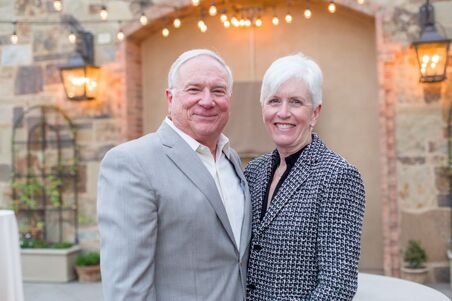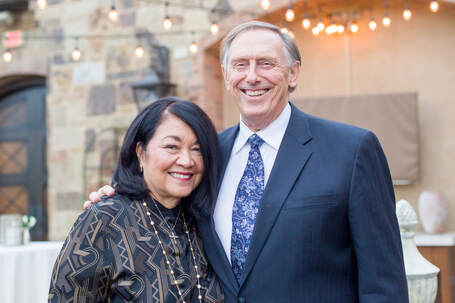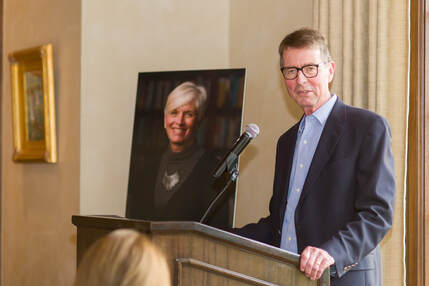This article originally appeared in the fall 2019 issue of the School of Education magazine, Advancing. To view a PDF, click here.
Building a Past...Creating a Future
Founding Dean Deborah Vandell led the School of Education in its transition from department to school. Now, through a recently established endowment, her contributions will live on forever.
|
The UCI School of Education - with the support of faculty, alumni and community partners - established in summer 2019 the Deborah Lowe Vandell Endowed Education Fund. Named after Founding Dean and Chancellor’s Professor Deborah Vandell, the endowment will support doctoral student research in the School of Education.
“I’m extraordinarily touched by the school’s effort to fund the endowment, and honored to have my name on it, but the real benefit is what the money is supporting,” Vandell said. “We have wonderful doctoral students, and they’re succeeding at the highest level in a variety of contexts.” The endowment was announced at an event hosted by Richard and Cheryll Ruszat, who also provided the endowment’s lead gift. |
“Deborah built the UCI School of Education into a school of excellence,” said Cheryll Ruszat. “She is an amazing human being, an outstanding researcher, and a great leader who was able to attract other scholars with the same qualities to build the school.”
Richard and Cheryll Ruszat are the president and executive director, respectively, of the Irvine Montessori Schools. One of their many contributions to UCI over the last three decades is the establishment of the University Montessori School on campus. The couple are long-time supporters of UCI across many disciplines. They are previous co-presidents of the Chancellor’s Club, current trustees of the UCI Foundation Board, and in 2013 received the UCI Medal, the campus’s most prestigious honor.
The Kay Family Foundation, a longtime partner on educational initiatives in Orange County, also contributed to the endowment.
“Deborah’s impact to the community and the education field is immense; she grew Education Studies from a department into a full-fledged school because of her focused passion to revolutionize the study of education through a progressive approach,” said Ethan Kay. “We are honored to support her legacy.”
Gifts to support the endowment also came from alumni, particularly graduate students who were advised by the founding dean.
Richard and Cheryll Ruszat are the president and executive director, respectively, of the Irvine Montessori Schools. One of their many contributions to UCI over the last three decades is the establishment of the University Montessori School on campus. The couple are long-time supporters of UCI across many disciplines. They are previous co-presidents of the Chancellor’s Club, current trustees of the UCI Foundation Board, and in 2013 received the UCI Medal, the campus’s most prestigious honor.
The Kay Family Foundation, a longtime partner on educational initiatives in Orange County, also contributed to the endowment.
“Deborah’s impact to the community and the education field is immense; she grew Education Studies from a department into a full-fledged school because of her focused passion to revolutionize the study of education through a progressive approach,” said Ethan Kay. “We are honored to support her legacy.”
Gifts to support the endowment also came from alumni, particularly graduate students who were advised by the founding dean.
|
“I am fortunate to have worked with Deborah over the past few years, and to have learned from her,” said Kenneth Lee (’16, Ph.D.). Vandell advised Lee during graduate school and hooded him during his commencement ceremony. Lee, who now works as a senior research analyst at Pearson, contributed to the endowment. “Deborah’s mentorship has guided me and a number of her students to various careers and positions where we can have a positive impact on the development of children and youth around the world.”
This summer, Vandell was also bestowed the title of Chancellor’s Professor, given by UCI to persons who have earned the title of Professor and who have demonstrated unusual academic merit and whose continued promise for scholarly achievement is unusually high. |
Vandell joined the Department of Education as chair in 2005. At that time, the university had as part of its master plan a desire to grow the department - which was already a powerhouse in teacher education - into a school. As chair, Vandell was tasked with recruiting faculty and establishing a doctoral program.
Working alongside university leadership – including former Chancellor Michael Drake, former Provost Michael Gottfredson, and former Vice Provost for Academic Planning Michael Clark - Vandell envisioned a school comprised of faculty whose research interests covered a multitude of disciplines. Following this strategy, the school would be one that focused on the myriad factors that affect human development and education, not just those confined within the classroom.
“That resonated with many of the professors we began recruiting; they shared a vision and saw the potential of a broader school of education,” Vandell said.
Greg Duncan and George Farkas, leading scholars in economics and sociology, respectively, were among the first professors to join. A couple of years later, the department added Jacquelynne Eccles, a leading motivational psychologist. Duncan, Eccles and Farkas are all now distinguished professors at the School of Education.
Working alongside university leadership – including former Chancellor Michael Drake, former Provost Michael Gottfredson, and former Vice Provost for Academic Planning Michael Clark - Vandell envisioned a school comprised of faculty whose research interests covered a multitude of disciplines. Following this strategy, the school would be one that focused on the myriad factors that affect human development and education, not just those confined within the classroom.
“That resonated with many of the professors we began recruiting; they shared a vision and saw the potential of a broader school of education,” Vandell said.
Greg Duncan and George Farkas, leading scholars in economics and sociology, respectively, were among the first professors to join. A couple of years later, the department added Jacquelynne Eccles, a leading motivational psychologist. Duncan, Eccles and Farkas are all now distinguished professors at the School of Education.
|
In 2007, the Department of Education welcomed its first doctoral student cohort. In 2012, the School of Education was officially established. Vandell became the school’s founding dean.
With a strong doctoral program and credential program in tow, Vandell and others turned their attention to establishing an undergraduate program. Derived from the structure and mission of the doctoral program, in 2014 a bachelor’s degree in Education Sciences was created, the first of its kind in the nation. “We owe a great debt of gratitude to Deborah for the School of Education’s current personnel, programming and prowess,” said Richard Arum, dean and professor. “Thanks to her, we are the home of internationally recognized thought leaders in a wide-range of disciplines. The school’s faculty and curriculum study the entire lifespan in a variety of contexts, and improve educational outcomes for all students.” |
Vandell’s research focuses on the effects of developmental contexts – such as early child care, K-12 schools, afterschool programs, families – on children’s social, behavioral and academic functioning. Her interest in the topic began while she was an undergraduate at Rice University. During a sociology class, she observed several different Head Start programs, and noticed a large disparity in the quality of programming.
“It struck me then that the difference in experience has to be making a difference in children’s lives,” Vandell said. “From that moment, it became what I was interested in studying, and here I am, 50 years later, studying the topic still.”
In the late 1980s, Vandell began work as one of the principal investigators on the NICHD Study of Early Child Care and Youth Development. The longitudinal study tracked 1,300 children from birth to age 27 and counting. The study is considered one of the most comprehensive studies of the short-term and long-term effects of early education programs, schooling, and the family on children’s development.
A native of Beaumont, Texas, Vandell will become an emerita faculty this fall. She is looking forward to continuing her research on human development, including the 1,300 children she’s been tracking since birth; Vandell would like to track the group into their 30s.
“I am having so much fun doing research and writing and working with students and colleagues,” Vandell said. “This research has implications for thinking about early experiences in children’s later functioning, and the findings could suggest that quality settings are important for all children. That’s a message I’d like to work on for the next 10 years.”
To make a contribution to the Deborah Lowe Vandell Education Fund, please click here.
To view a photo album from the event announcing the endowment, click here.
“It struck me then that the difference in experience has to be making a difference in children’s lives,” Vandell said. “From that moment, it became what I was interested in studying, and here I am, 50 years later, studying the topic still.”
In the late 1980s, Vandell began work as one of the principal investigators on the NICHD Study of Early Child Care and Youth Development. The longitudinal study tracked 1,300 children from birth to age 27 and counting. The study is considered one of the most comprehensive studies of the short-term and long-term effects of early education programs, schooling, and the family on children’s development.
A native of Beaumont, Texas, Vandell will become an emerita faculty this fall. She is looking forward to continuing her research on human development, including the 1,300 children she’s been tracking since birth; Vandell would like to track the group into their 30s.
“I am having so much fun doing research and writing and working with students and colleagues,” Vandell said. “This research has implications for thinking about early experiences in children’s later functioning, and the findings could suggest that quality settings are important for all children. That’s a message I’d like to work on for the next 10 years.”
To make a contribution to the Deborah Lowe Vandell Education Fund, please click here.
To view a photo album from the event announcing the endowment, click here.




